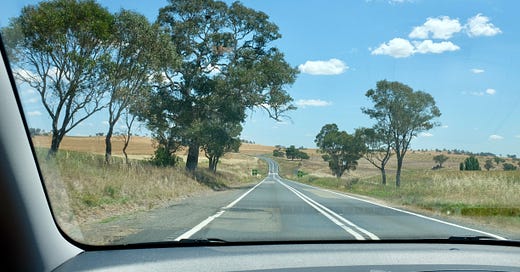The Australian border authorities are notoriously strict. Boots that arrive from the English countryside must be cleaned of all their autumnal dirt, and food must be sealed and declared. The fierce reputation unnerves me, but after nineteen hours in the air I don’t want an extra minute in another room full of recycled oxygen. So with two jars of organic honey packed in my luggage I’m willing to try my luck with the customs declaration form, and leave the box titled Bee Products unmarked.
I’m waiting for my baggage next to carousel three, swaying with jet lag, when the Sydney arrivals tannoy declares: “Please can passenger Alistair Macleod find a member of the ground staff team?” In a paranoid frenzy I rush to fill out another form - this time ticking the correct box - and set off to find someone in a high-vis jacket.
“Travelling from the United Kingdom?” the man asks,
- Yep
“Bee products? honey?”
-Yep
“You’re all good mate”, the accent is thick and he probably wonders why I look so worried. I am, after all, quite rattled by six meals and just three hours of sleep at 33,000 feet.
Suspecting that the problem is my luggage, I meander over to the help desk and give them my passport details. As I wait, my phone pings. It’s a message from my mum: “ Sadly she deteriorated quickly… on the advice of three vets we put her to sleep…it was incredibly peaceful.” My dog of fourteen years has passed away. I was probably just starting Inside Out 2, half way across China as it happened.
Meghan finds me a couple minutes later. It would be quite the choice of moment to reveal such a red flag - does she really think I’m crying because my baggage is still stuck in Singapore? I don’t want to dull the mood of her eighteen month reunion with her family, and so keep the real reason to myself until we’re home that evening. All in all, it’s not the start I expected.
Even though the bag is delivered to my front door twelve hours later, Singapore Airlines still compensate me, $150 is put onto a pre-paid cash card. Three days later, the Melbourne Cup takes place and I decide a betting slip in the scrapbook will mark these early days nicely. I take a punt, $5 each way on Knight’s Choice at 78/1. Later that afternoon, it crosses the line first and I head to TAB to collect the $390 winnings. It feels as if the two incidents are tied together - different strokes of luck have intervened to determine the outcome of moving to the the other side of the world.
And a few days later I complete a test copywriting piece to secure some upcoming freelance work. It’s $150 for three hours work. My Oceania portfolio continues to grow. Another brick in the wall. One step at a time. Insert cliche here.
Once the worst of the jet lag has faded, we set out for the country to see Meghan’s dad in Griffith, NSW. The drive is over six hours, and is only occasionally interrupted by towns that become smaller as Sydney disappears in the rear view mirror. The landscape is flat and a reddish brown, and after 500 kilometres there is very little on the road, except for the road trains that are brimming with harvest crop.

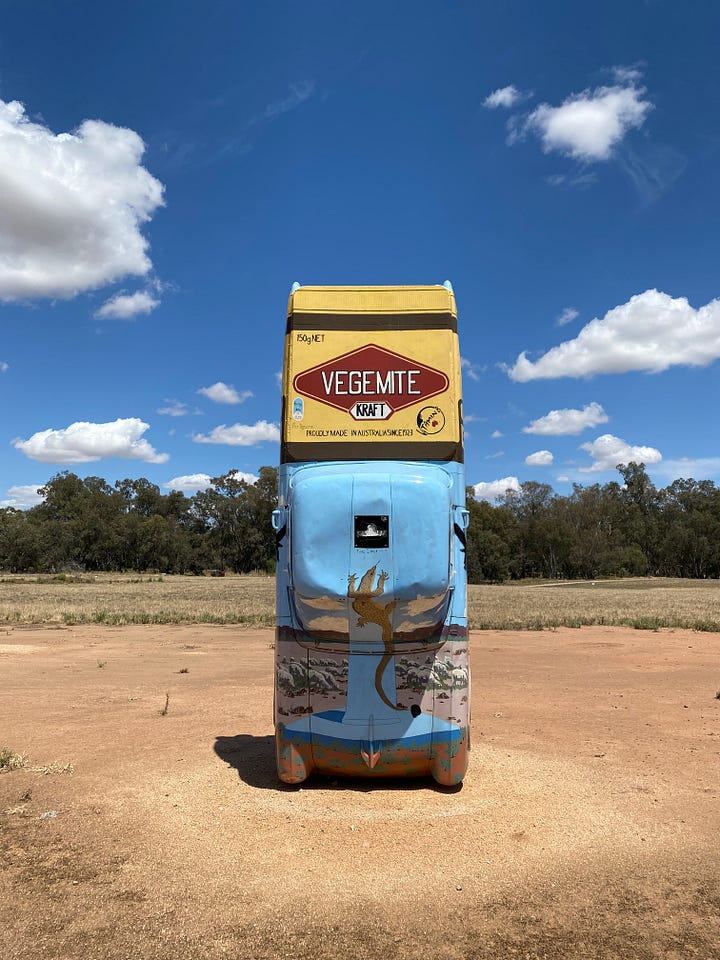
Then Griffith emerges - the oasis in the desert - and there are fields of orange trees, flanked and divided by neat irrigation channels, pulling water from the Murrumbidgee river. The unlikely success of the town’s survival, in such a remote and dry environment, is often attributed to the wave of Italian settlers at the start of the twentieth century. They were accustomed to the heat in a way that Anglo farmers couldn’t understand.
The town has a rich Italian cultural legacy. La Scala Restaurant and Bertoldo's Pasticceria, as well as choice of local wineries: De Bortoli Wines, Calabria Wines, Piccolo Family Farm. There is a particularly strong connection to the region of Calabria, and the cells of organised crime that have travelled from there. Just put ‘Donald Mackay’ into your preferred search engine.
After fives nights and one viewing of Gladiator 2, we continue our itinerary four hours further north. The heat haze becomes stronger, the grain trucks seem bigger and the Hyundai i30 feels even smaller.
We are off to see my cousin who lives somewhere along forty-five kilometres of unsealed road. She came to the nearest town, Nyngan, as a nurse and then married a farmer. They live on a 55,000 acre plot of land, a patchwork of paddocks that has grown through six generations of dedication to farming, beginning back in 1911.


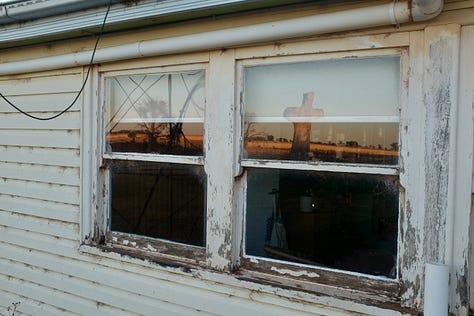
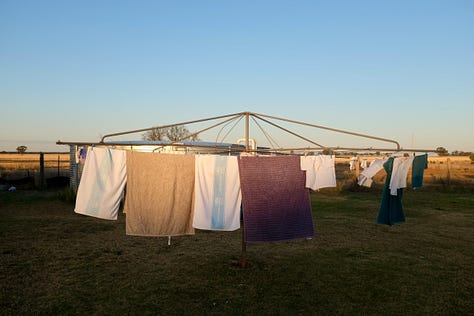
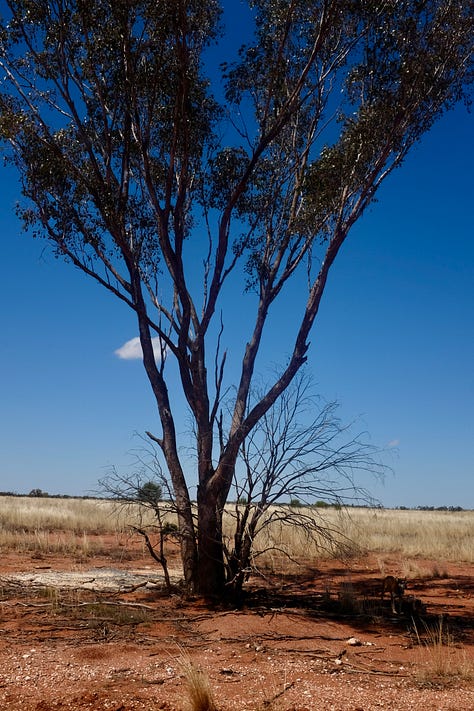
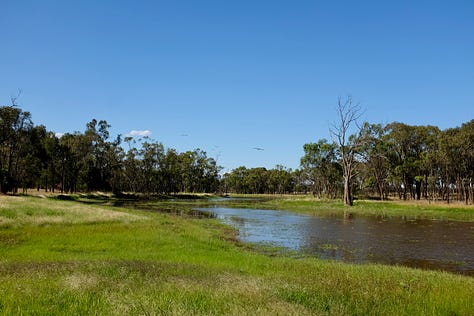
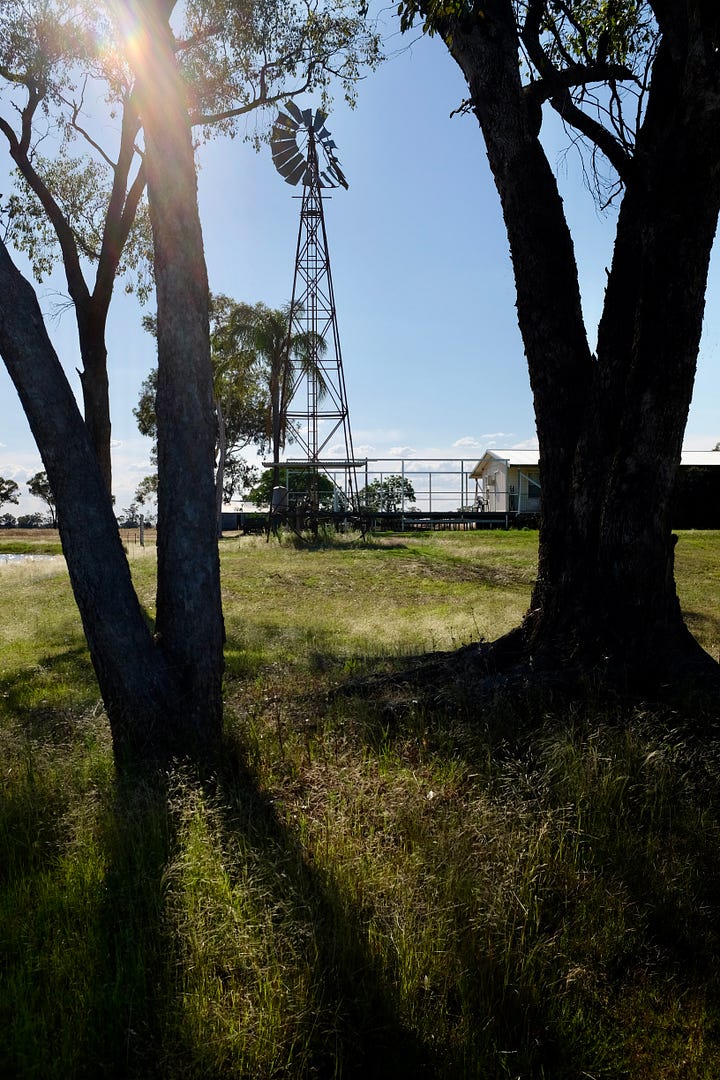

From the main house of the farm it’s a 3km round trip to the post box. They have their own petrol pump. They have a two-seater plane. And they have a pack of kelpies. It is a lifestyle far removed from urban living; somewhat intimidating and appealing in equal measures.

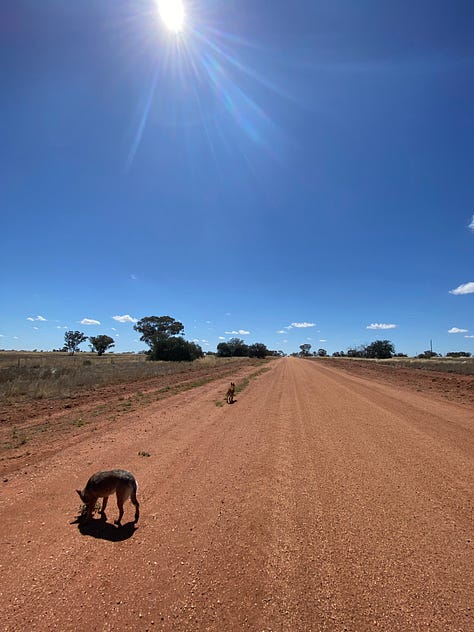

On the first evening, around 9.30pm, we jump aboard one of the utes. As we tear across the fields there is a sheet of star constellations above us, and the distance glow of a single tractor ploughing the field on nightshift. The amount of space is incomprehensible. It is a self-contained world, where tradition can be enjoyed unobstructed: the meeting point of bright headlights, rifles and wild animals. It feels lawless, an undeniable rush.
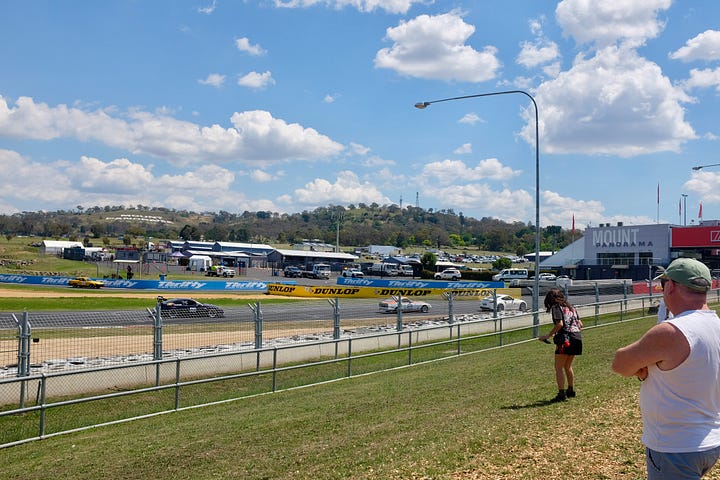

It has been a month since landing here and I’ve neglected writing. Not without good reason, as I try to establish some routine.
My first impression is that a healthy and comfortable lifestyle is possible here in a way that London could never offer me. And, as long as I keep running, then the phenomenal Italian home cooking that I’ve been spoilt by will never catch up with me.
Work has begun. Three days a week of physical labour doing garden installations. On at 6.45am, lifting, digging, shovelling, drenched in sweat. Off at 3pm, a cold schooner on the walk home. It is phenomenal for the brain, and it’ll allow me to meet my rent, leaving the other four days in the week to pursue freelance copywriting and explore what is around me.

